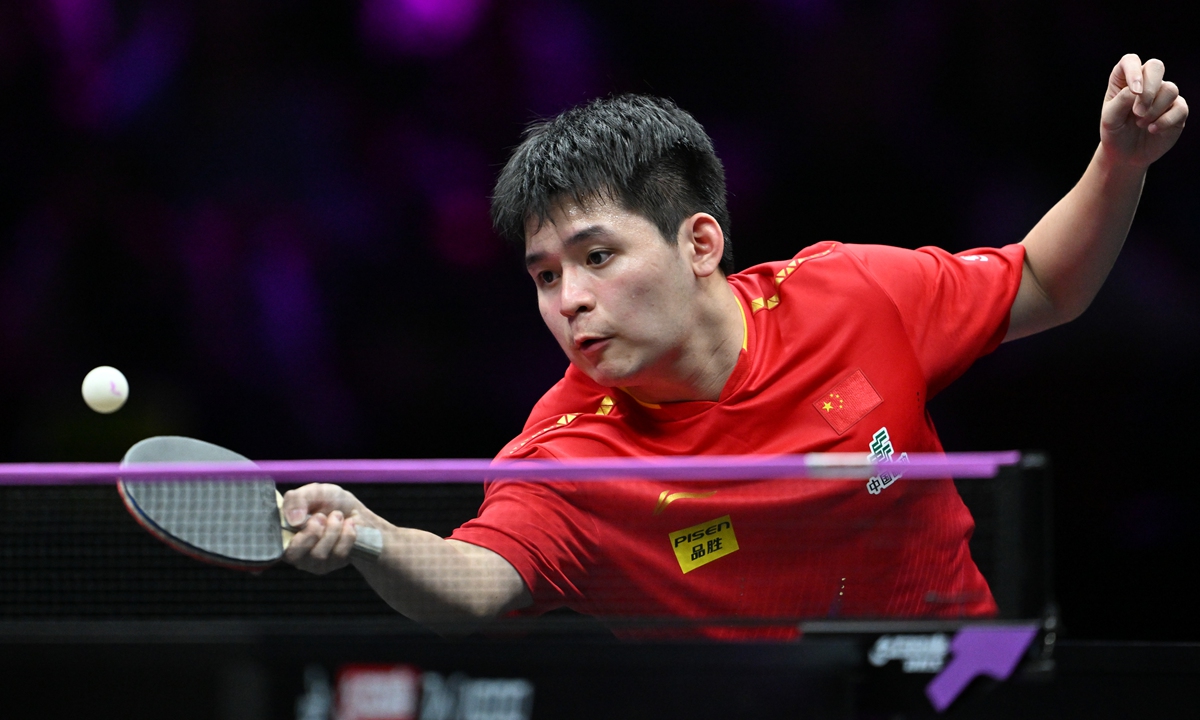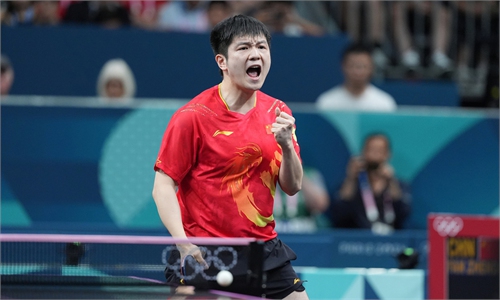ARTS / CULTURE & LEISURE
Lin Shidong’s setback could be a new beginning for Chinese table tennis
The men's final of the 2025 Table Tennis World Cup in the Macao Special Administrative Region on Sunday evening saw Brazil's Hugo Calderano defeat China's Lin Shidong 4-1. The victory was Calderano's first World Cup title as a professional, which ended China's four-time winning streak in the men's World Cup singles.
It was also the first time since 2017 that China's men's team lost a singles title at one of the "Big Three" events - the Olympics, World Table Tennis Championships, and ITTF World Cup - according to Chinese media reports.
Following the result, relevant hashtags garnered over 150 million views and discussions by Monday evening.
Some claimed that the loss of the championship reflects deeper issues in team development, especially a "core vacuum" and a generational gap in the Chinese men's table tennis team now that Ma Long and Fan Zhendong have faded from the international stage.
"When China loses two table tennis matches, what matters is understanding why they lost and not panicking and acting like the sky is falling," Beijing-based sports commentator Wang Dazhao told the Global Times, adding that China's overall strength in table tennis remains formidable. Prior to Lin Shidong's loss, Chinese player Wang Yidi was defeated 1-3 by French player Yuan Jia'nan on April 15.

"Hugo's nontraditional approach disrupts opponents' rhythm, adds psychological pressure - especially for higher-ranked players - and leads to more unforced errors. In this aspect, Chinese athletes were clearly underprepared. It's a wake-up call that demands tactical reflection and more targeted training," Wang said.
On the whole, the Chinese table tennis team remains strong and talented. According to the latest rankings released by the International Table Tennis Federation on April 15, the Chinese national table tennis team continues to dominate the world rankings. In men's singles, Chinese players Lin Shidong and Wang Chuqin hold the top two spots, while Japan's Tomokazu Harimoto ranks third.
But such dominance shouldn't become the quixotic expectation that China should "sweep" all the gold medals - so much so that losing even one is seen as a "breach" or even a "failure," said Wang.
In global sports, no one is entitled to win every time. Even the star-studded US men's basketball team doesn't always win Olympic or World Cup golds. In the men's 4×100m medley relay at the Paris Olympics, the Chinese team once broke the US' 40-year dominance to win gold - a triumph we rightfully celebrated as an inspiring breakthrough. By the same logic, the rise of a new generation of world-class talents such as Brazil's Hugo Calderano reflects a testament to the sport's global growth. This should be seen as something to celebrate, not as a cause for despair simply because the championship title changed hands.
Table tennis belongs to the world. With hard work, any athlete - regardless of nationality - can rise to the top. As a dominant force in table tennis, the Chinese team should embrace the role of a leader - maintaining an open mindset and sharing advanced experience. In doing so, Chinese table tennis can contribute to the sport's global development.
China's table tennis team does not need to panic. This loss should be a new beginning - an opportunity to reflect and prepare for what's next. In a world of growing competitiveness in table tennis, China's team remains strong, and more importantly, still has the power and duty to lead.
The author is a reporter with the Global Times. life@globaltimes.com.cn
It was also the first time since 2017 that China's men's team lost a singles title at one of the "Big Three" events - the Olympics, World Table Tennis Championships, and ITTF World Cup - according to Chinese media reports.
Following the result, relevant hashtags garnered over 150 million views and discussions by Monday evening.
Some claimed that the loss of the championship reflects deeper issues in team development, especially a "core vacuum" and a generational gap in the Chinese men's table tennis team now that Ma Long and Fan Zhendong have faded from the international stage.
"When China loses two table tennis matches, what matters is understanding why they lost and not panicking and acting like the sky is falling," Beijing-based sports commentator Wang Dazhao told the Global Times, adding that China's overall strength in table tennis remains formidable. Prior to Lin Shidong's loss, Chinese player Wang Yidi was defeated 1-3 by French player Yuan Jia'nan on April 15.

Chinese paddler Lin Shidong Photo: IC
In terms of Hugo's performance in the tournament, he defeated world No.3 Tomokazu Harimoto, world No.2 Wang Chuqin, and world No.1 Lin Shidong. His championship win is an impressive achievement, nothing short of well-deserved, the analyst said."Hugo's nontraditional approach disrupts opponents' rhythm, adds psychological pressure - especially for higher-ranked players - and leads to more unforced errors. In this aspect, Chinese athletes were clearly underprepared. It's a wake-up call that demands tactical reflection and more targeted training," Wang said.
On the whole, the Chinese table tennis team remains strong and talented. According to the latest rankings released by the International Table Tennis Federation on April 15, the Chinese national table tennis team continues to dominate the world rankings. In men's singles, Chinese players Lin Shidong and Wang Chuqin hold the top two spots, while Japan's Tomokazu Harimoto ranks third.
But such dominance shouldn't become the quixotic expectation that China should "sweep" all the gold medals - so much so that losing even one is seen as a "breach" or even a "failure," said Wang.
In global sports, no one is entitled to win every time. Even the star-studded US men's basketball team doesn't always win Olympic or World Cup golds. In the men's 4×100m medley relay at the Paris Olympics, the Chinese team once broke the US' 40-year dominance to win gold - a triumph we rightfully celebrated as an inspiring breakthrough. By the same logic, the rise of a new generation of world-class talents such as Brazil's Hugo Calderano reflects a testament to the sport's global growth. This should be seen as something to celebrate, not as a cause for despair simply because the championship title changed hands.
Table tennis belongs to the world. With hard work, any athlete - regardless of nationality - can rise to the top. As a dominant force in table tennis, the Chinese team should embrace the role of a leader - maintaining an open mindset and sharing advanced experience. In doing so, Chinese table tennis can contribute to the sport's global development.
China's table tennis team does not need to panic. This loss should be a new beginning - an opportunity to reflect and prepare for what's next. In a world of growing competitiveness in table tennis, China's team remains strong, and more importantly, still has the power and duty to lead.
The author is a reporter with the Global Times. life@globaltimes.com.cn



